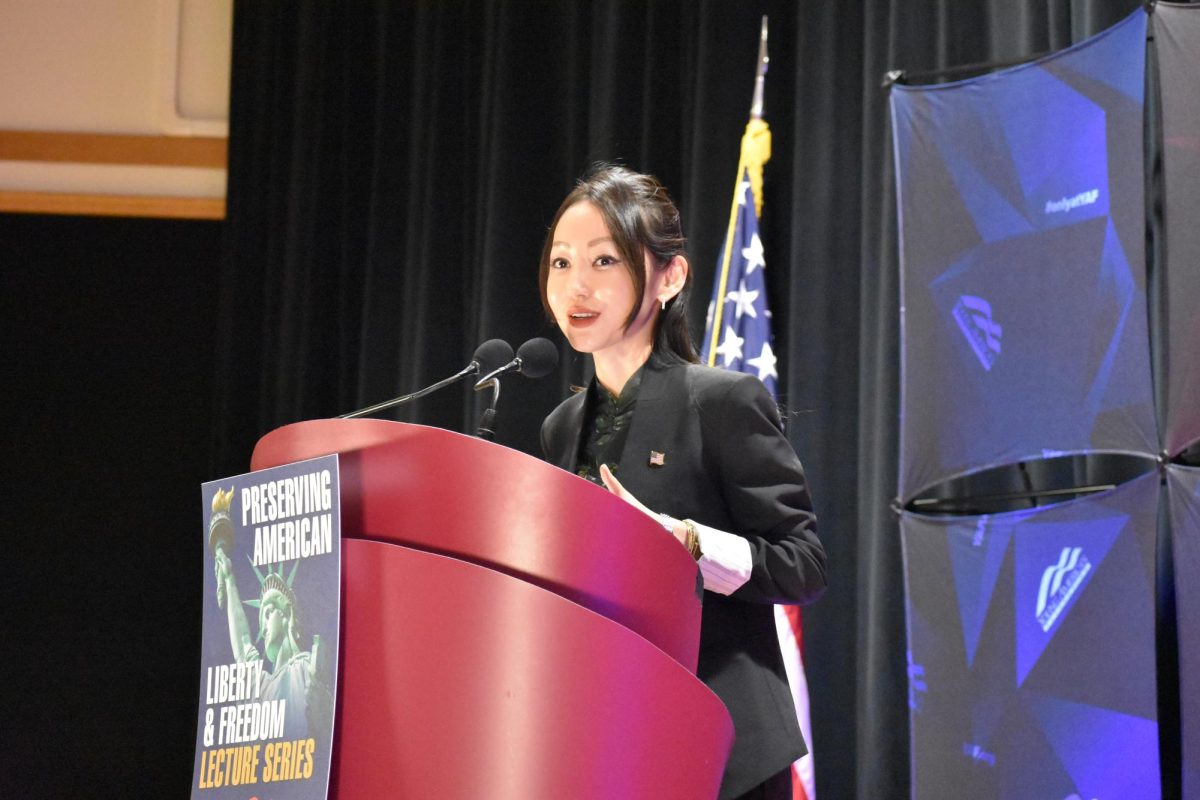Conservative activist and North Korean defector Yeonmi Park recounted her escape from her home country — and her subsequent perspective on the United States — in her talk “The Truth About Communism” in Pugh Auditorium on Nov. 8.
“Before I even came out of my mother’s tummy, my life was determined for me by the Communist Party of North Korea,” Park said.
Park, who was invited to speak by Wake Forest’s chapter of Young Americans for Freedom (YAF), first drew international attention when a video of her speech at the 2014 human rights-focused One Young World Summit in Ireland went viral. Since then, she has gained media popularity as a celebrity defector across platforms, appearing on podcasts such as “The Joe Rogan Experience.” Her YouTube channel has more than 1 million subscribers, and she has written about life under the communist dictatorship in her 2015 memoir “In Order to Live.”
“I think people were really attracted to Yeonmi Park because her story is just incredible,” YAF president Pierce Sandlin said. The organization selected Park from a group of speakers to hear from someone with perspectives from both North Korea and the United States.
Throughout her talk, Park described growing up in what she called “truly the darkest place in the whole world,” where she said brainwashing is prevalent in schools and widespread starvation leads many to struggle for survival. She explained how in 2007, when she was 13 years old, she and her family escaped the communist regime by fleeing into China, where she was sold as a sex slave for less than $200.
As Park told the audience about her difficult journey to the United States, she also emphasized what she thought were the most striking differences between the communist society of her youth and the United States, of which she has been a citizen since 2021. Many of these differences are described in her most recent book, “While Time Remains,” in which she expresses her disenchantment with American liberalism following her time studying human rights at Columbia University. There, Park grew disillusioned by what she considered to be a similar kind of indoctrination as that used in her home country.
“I literally thought I was time-traveling back to North Korea,” Park said of her first day of class. She found the ideology at Columbia to be “anti-freedom, anti-capitalism and anti-America.”
Her observations extended outside of academia, too. Park spoke to the dangers of what she called North Korea’s “socialist” system as she recounted experiences with North Korea’s inadequate hospital system.
During the Q&A session, students described Park’s speech as “powerful” and expressed that they were moved by Park’s experience.
“I appreciated the opportunity to hear Park’s perspective on human trafficking and the realities of living in a communist country,” senior Emily Clark said. “It made me realize how much I didn’t know.”
Sandlin said Park’s personal story was heartbreaking to listen to.
“I was speechless, like I just didn’t know how to respond to her testimony of enduring being sold into sex slavery and details she goes into,” Sandlin said.
Others, however, cast doubt about some of the details of Park’s story.
Sam Stinson, a sophomore and East Asian Studies minor, described Park as a “grifter.” As someone who grew up with mixed American and Chinese descent, Stinson questioned Park’s claims that the Chinese government supports organ trafficking and sex slavery.
“I think it’s generally harmful for her to be telling lies like that, and it’s very much like all of her lies have the contribution of spreading anti-communist propaganda,” Stinson said. “She’s on another plane of political existence and ideology.”
Leilei Pu, a sophomore majoring in Religious Studies, also pointed out several aspects of Park’s account that she found untrustworthy and questionable. She specifically objected to Park’s claim that she was forced by South Korean missionaries to adopt Christianity to receive aid in escaping.
As a Chinese international student, Pu was upset that Park’s speech did not emphasize enough the separation of politics from people, such as saying that “Chinese men like virgins.” She thought it was inadequate and irresponsible for Park to simply mention in the Q&A that she herself had no opinion about the Chinese people.
“She didn’t think about whether her speech with so much propaganda would exacerbate racial discrimination. When some people start hating Chinese, as they did with the COVID-19 controversy, then it becomes Asian hate,” Pu said.
She continued: “I’m afraid that everyone would really believe her story. I don’t want to call her a liar, and I respect her experience, but I don’t see [the story] very powerful as a listener, I just feel like I’m being targeted.”
A recording of Park’s talk can be found here.
















